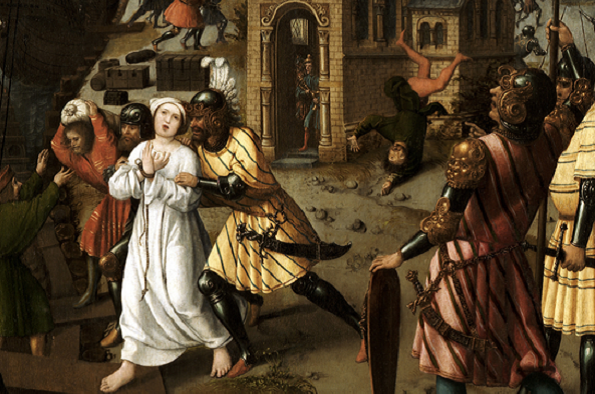
MLC Research Seminar with Christian Cooijmans and Antonia Wimbush
Start time: 13:00 / End time: 14:00 / Date: 10 Mar 2021 Open to: Students in host dept/school/institute/centre / Staff in host dept/school/institute/centre / Students from same Faculty as host dept/school/institute/centre / Staff from same Faculty as host dept/school/institute/centre / Students within this Faculty / Staff within this Faculty / Any UOL students / Any UOL staff / Students from other HEIs / Staff from other HEIs/research institutions / Any potential undergraduate students / Any potential postgraduate students Type: Seminar Cost: Contact: For more information contact Barbara Spadaro at b.spadaro@liverpool.ac.uk Dr Chris Cooijmans, British Academy Postdoctoral Fellow Texts, Traditions, Tropes: Vikings in the Late Medieval Saints’ Lives of the Low Countries Long after the viking phenomenon had receded from the North Sea littorals, the reach and ramifications of this overseas Scandinavian endeavour continued to occupy the minds of medieval hagiographers throughout these coastal territories. Accordingly, across the Low Countries, viking mariners featured as prominent antagonists in various saints’ lives and other devotional works authored between the twelfth and sixteenth centuries, harkening back to earlier medieval pasts both real and imagined. Navigating an intricate network of textual transmission and influence, this paper will concentrate on a number of specific representations of viking activity in the (after)lives of regional saints, including those of Walfridus of Bedum, Jeroen of Noordwijk, and Servatius of Tongeren. Situating these records within their respective contexts of composition, it will examine the continued but changing narrative role(s) played by vikings in the establishment and reinforcement of saints’ cults in the later medieval Low Countries. Dr Antonia Wimbush, Leverhulme Early Career Fellow A History of the BUMIDOM: Gender, Race, and Caribbean Migration In the post-war era, huge waves of migrants from the French Caribbean islands of Guadeloupe and Martinique (and from Réunion in the Indian Ocean) arrived in metropolitan France to plug the labour gap and to rebuild infrastructure which had been damaged during World War Two. This transatlantic migration was made possible thanks to the departmentalization law of March 1946 which converted these former colonies into French overseas departments. From 1962 to 1983, 160, 000 people migrated through the BUMIDOM (Office for the Development of Migration in the Overseas departments). The unique feature of this programme was its institutional nature, as migration was entirely orchestrated by the French state. In fact, migration was actively encouraged among young Guadeloupeans and Martinicans: their travel was paid for and they were promised assistance with finding housing and employment. Yet many were given underpaid, low-skilled jobs that the metropolitan (white) population refused to do in health care, transportation, and the domestic service sector. Women in particular were targeted; it was hoped that they would learn more ‘modern’ family values in the metropole and pass them onto their children once they eventually returned to the Caribbean. This paper explores the multiple origins, causes, and consequences of the BUMIDOM scheme on the metropole and on the Caribbean departments. It argues that this Caribbean labour migration was highly racialized and gendered, and thus the BUMIDOM should be considered as part of a longer history of gendered migration to France from former French colonies. In addition, it considers the current demographic issues that are affecting the Caribbean islands – too many young people have moved to mainland France to study and work, which has led to an ageing population on the islands – as a direct legacy of governmental migration and development policies in place in the mid-twentieth century. Please email Julie Hudson to book onto this event - hudsonje@liverpool.ac.uk Click on "Create a calendar file" and your browser will download a .ics file for this event. Microsoft Outlook: Download the file, double-click it to open it in Outlook, then click on "Save & Close" to save it to your calendar. If that doesn't work go into Outlook, click on the File tab, then on Open & Export, then Open Calendar. Select your .ics file then click on "Save & Close". Google Calendar: download the file, then go into your calendar. On the left where it says "Other calendars" click on the arrow icon and then click on Import calendar. Click on Browse and select the .ics file, then click on Import. Apple Calendar: The file may open automatically with an option to save it to your calendar. If not, download the file, then you can either drag it to Calendar or import the file by going to File >Import > Import and choosing the .ics file.About the event
Add this event to my calendar